US And Israel Discuss Regional Issues, Iran’s ‘Destabilizing Behavior’
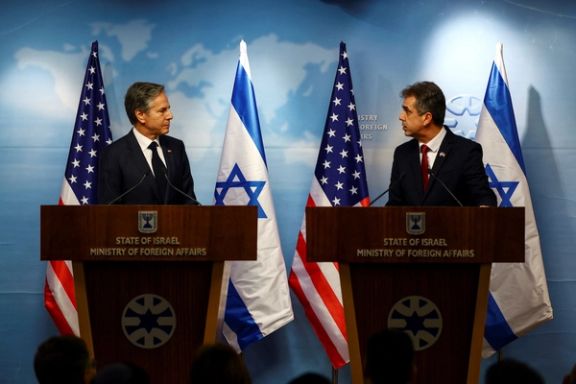
US and Israeli foreign ministers held a telephone call on Tuesday to discuss “Iran’s destabilizing behavior, among other issues, the State Department announced.

US and Israeli foreign ministers held a telephone call on Tuesday to discuss “Iran’s destabilizing behavior, among other issues, the State Department announced.
Secretary of State Antony Blinken and Israeli Foreign Minister Eli Cohen consulted over issues of Iran and “Israel’s integration into the region,” a possible reference to US efforts to expand the Abraham Accords by convincing Saudi Arabia to establish relations with Israel.
An announcement by State Department also said that “Secretary Blinken conveyed concern over the recent escalation of violence, which has directly affected US citizens in the West Bank, and underscored the need for parties to work further to further de-escalate the situation.”
Israeli media reported on Tuesday thatthe Palestinian Islamic Jihad (PIJ)is buying weapons and loyalty in the West Bank using Iranian money.
The PIJ has established several armed cells and recruited dozens of gunmen in the northern West Bank, specifically in Jenin and Nablus. “The PIJ has become a dominant force in the northern West Bank, largely thanks to the financial aid it receives from Iran," a source told Israel's Jerusalem Post.
Since March, the Iranian regime has intensified its support to Palestinian militant groups and has publicly urged them to attack targets in Israel. Tehran officials expressed gratification at a serious flare-up of violence in April and pledged more support.
Defense Minister Yoav Gallant announced Tuesday that Israel seized millions of dollars’ worth of digital funds intended for use by Iranian-backed Lebanese group Hezbollah and the Quds Force arm of the Revolutionary Guards.
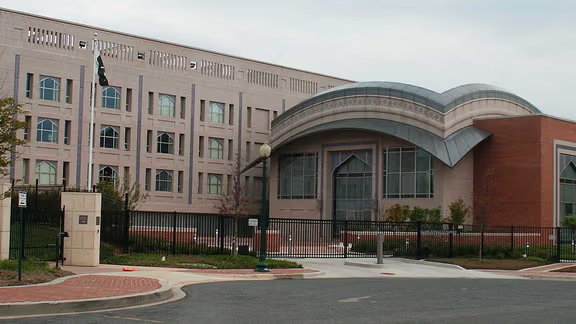
Iran’s Interests Section in Washington DC has been accused of corruption and one of its staff now faces prosecution.
A political activist has told Iran International that Manouchehr Jafarzadeh is being prosecuted for charging extra fees for consular services.
Activist Siamak Aram said personnel of the office ask for cash in return for consular services.
According to Aram, the investigations are underway to get more information about the illegal act by Jafarzadeh; however, there are possibilities of systematic corruption to conduct money laundering.
Earlier this week, Iran's chief justice claimed he is battling corruption in government bodies.
In a televised interview aired by the state broadcaster IRIB Wednesday evening, Gholamreza Mohseni-Ejei said he and the organizations under his supervision would never shut their eyes to corruption and infringements of the law, and in some cases their actions have upset the government of President Ebrahim Raisi and caused complaints.
Last year, the former chief of Iran's state television, Mohammad Sarafraz accused the government and banking system of systematic corruption that has led to vast income gaps among Iranians.
Sarafraz accused the IRGC and the intelligence agencies of “systematic corruption which is likely to land the country in deep trouble,” saying that most of what the intelligence agencies and the IRGC do in Iran are illegal, but they can get away with it as no one is in control. Meanwhile, none of these organizations assume responsibility for the instability their actions create.
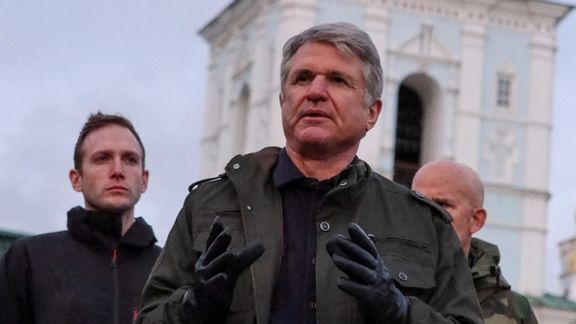
US House of Representatives Foreign Affairs Committee Chairman introduced a bipartisan resolution reaffirming the US commitment to preventing a nuclear Iran.
Committee Chairman Michael McCaul (R-TX) along with Congressmen Brad Schneider (D-IL), Doug Lamborn (R-CO), Jared Golden (D-ME), Joe Wilson (R-SC), Brad Sherman (D-CA), Rich McCormick (R-GA), and Kathy Manning (D-NC) introduced the resolution on Tuesday, June 27.
A flurry of media reports in recent weeks indicated that the Biden administration has been holding indirect and possibly direct talks with the Islamic Republic of Iran to hammer out an interim, limited nuclear deal that would offer financial rewards in exchange for some limits on Iran’s uranium enrichment.
Many members of Congress are concerned that the administration intends to reach an unwritten agreement with Tehran to avoid Congressional review. A 2015 law requires any deal with Iran that would result in sanctions reduction to be presented to Congress.
“In the face of unprecedented nuclear provocations from the Iranian regime, it is vital the United States make clear that a nuclear Iran is unacceptable,” said McCaul in an announcement about the bipartisan resolution.
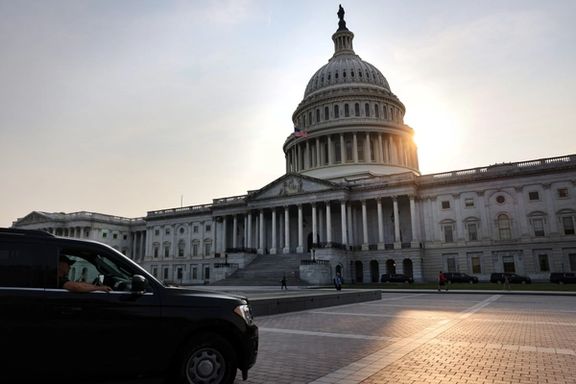
“I am proud to lead this bipartisan resolution declaring with no ambiguity that Iran must not be able to obtain a nuclear weapon, and that the United States is willing to use all means necessary to prevent a nuclear Iran. Nothing is off the table.”
The resolution also says that the US should “recognize and support the freedom of action of partners and allies, including Israel to prevent Iran from obtaining a nuclear weapon.”
Past and present Israeli governments have repeatedly threatened to launch a military attack against Iran if they see the imminent danger of nuclear weapons. Prime Minister Benjamin Netanyahu has said that his government will not recognize any international agreements, if it concludes that Israel faces the danger of a nuclear Iran.
A bipartisan group of 26 US senators last week asked President Joe Biden in a letter not to rush into a bad agreement.
Rep. McCaul had sent a letter to the President June 15 saying, “I am disturbed by recent revelations that the Administration has re-engaged in ‘proximity talks’ with the Iranian regime, and that the results of these discussions have included the apparent greenlighting of sizable payments to Iran.”
He was referring to the White House allowing Iraq to release more than $2.7 billion in Iran’s frozen funds earlier this month.
McCaul urged Biden to respect the Iran Nuclear Agreement Review Act of 2015 (INARA), which was enacted during the finalization of the Joint Comprehensive Plan of Action (JCPOA) in 2015 to allow Congress to oversee dealings with Tehran. The Obama administration decided not to make the JCPOA nuclear deal a treaty, given opposition in Congress at the time and agreed to INARA to neutralize opposition among lawmakers.
The administration has denied it has reached any new deals with Iran, including an interim unwritten agreement, but many media sources and Israeli politicians have indicated that some sort of an agreement has been discussed.
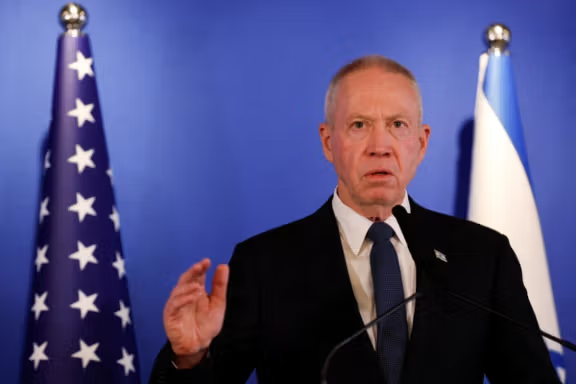
Israel has seized millions of dollars worth of digital funds intended for use by Iranian-backed Lebanese group Hezbollah and the Quds Force arm of the Revolutionary Guards.
Defense Minister Yoav Gallant made the announcement on Tuesday, revealing that Israel has seized digital wallets linked to IRGC and Hezbollah.
His ministry said that since the start of this year, "Hezbollah, Quds Force (IRGC’s extraterritorial force) and Syrian operatives have used digital currencies to receive funds from third parties via illegal transactions”.The Defense Ministry said it had also thwarted the transfer of millions of dollars to these operatives.
Speaking at a conference hosted by the ministry’s National Bureau for Counter Terror Financing (NBCTF), Gallant said, “I issued an order that enabled the confiscation of said funds, as well as their transfer to the State of Israel. In doing so, we have effectively cut off the flow of terror funds via this channel.”
“A few days ago, an extensive and precedent-setting operation — to expose a route for financing terror with digital currencies — was wrapped up. This is the first incident of this magnitude, in which an infrastructure led by Hezbollah and the Iranian Quds Force that transferred millions of dollars to be used by terror elements was thwarted,” he added.
He said that the NBCTF developed new tools with the Mossad spy agency, the IDF’s Military Intelligence Directorate, the Israel Police, and other bodies, in order to combat financing of terror groups using cryptocurrency.
Noting Iran’s involvement, he said, “Whoever finances terror, or maintains a financial relationship with terror operatives, must know that he is a target, just like anyone who directs terrorism."
“As you can see, this time too there is a clear line behind the terror [financing] moves that originate in Iran. Iran is the financier, trainer, and spreader of terrorism against Israel and many countries around the world, both directly and through its proxies at the borders,” Gallant said.
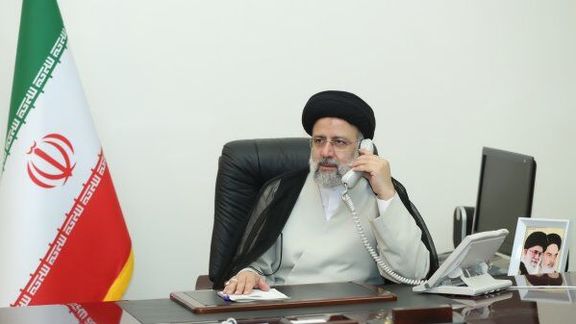
The Iranian President says developing ties with Qatar will boost regional and international cooperation between the two countries.
Ebrahim Raisi made the comments in a phone conversation with Qatari Emir Sheikh Tamim bin Hamad Al-Thani who had called to felicitate him on Eid al-Adha.
Raisi also appreciated the efforts of the Emir and Prime Minister of Qatar in advancing joint plans and agreements with the Islamic Republic of Iran.
Al-Thani congratulated the Iranian President and the Iranian people on Eid al-Adha and expressed willingness to boost economic cooperation.
Last week, European Union foreign policy official Enrique Mora and Iran’s chief nuclear negotiator Ali Bagheri-Kani held meetings in Qatar in what many believed to be related to issues pertaining to disputes with the United States.
Since September, the US has demanded an end to Iran’s weapons supplies to Russia that has included hundreds of Kamikaze drones used against Ukrainian military and civilian targets.
In February, US Special Envoy for Iran Robert Malley met with the Qatari foreign minister in Washington over efforts to kickstart the stalled talks to revive the 2015 nuclear deal, Qatari sources said.
Late in January, Al Thani visited Tehran where he delivered messages from world powers that are party to the Joint Comprehensive Plan of Action, particularly the US which does not have direct contact with the Islamic Republic.

In a rare public criticism, Iran’s Supreme Leader has admitted that the nation has lost trust in the judiciary, blaming it on malpractice and media representation.
“There is a small minority who abuse their position and tarnish the image of the judiciary in the eyes of the people,” Khamenei said in a revealing meeting with judiciary officials Tuesday.
He called on authorities to fight corruption within the judicial system and warned that "corruption is contagious". He said: "When corruption enters a system, this disease spreads. It is increasing day by day."
Khamenei said the media is partially to blame, tarnishing the judiciary's reputation further, refusing to acknowledge the heavy-handed and brutal punishments it has been handing down to civilians since the protests began in September in the wake of Mahsa Amini's death in morality police custody.
Khamenei's words contradict the fact that he controls the religious judiciary that is only accountable to him and plays the role of both prosecutor and judge. The courts in Iran are not independent, but part of the large bureaucracy known as the Judiciary, whose head is appointed by the Supreme Leader,
As “one of the main pillars in the establishment of the Islamic republic,” he said instability in the judiciary can lead to disruptions in the entire regime as he urged his inner circle to tighten up the flailing system.
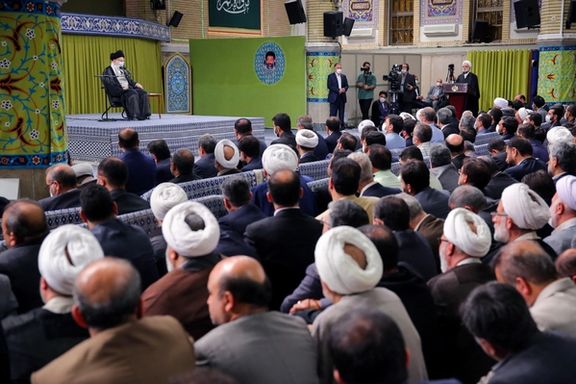
Political pundit Rouhollah Rahimpour told Iran International that the main duty of the judiciary has become defending the regime against the people and cracking down any voice of dissent.
He called the distrust of the judiciary a natural consequence "when the judicial system does not pursue justice" and only works as a tool in the hands of the regime to stifle criticism and quash protests.
The regime used overwhelming force with military weapons in its crackdown on the protests since September, killing more than 500 civilians and arresting tens of thousands more. Hundreds of other protestors suffered hospitalization and permanent injuries, including the loss of eyes when shotgun pellets were fired at the faces of demonstrators.
After the wave of nationwide protests which has still yet to subside, the Iranian regime has embarked on a wave of executions which has seen dozens of prisoners hanged this year.
Iran's Chief Justice Gholamhossein Mohseni Ejei claimed Monday that scores of Iranians only took part in protests due to foreign influence, undermining the strength of the Woman, Life, Freedom movement which has seen hundreds of thousands of Iranians calling for the end of the brutal dictatorship.